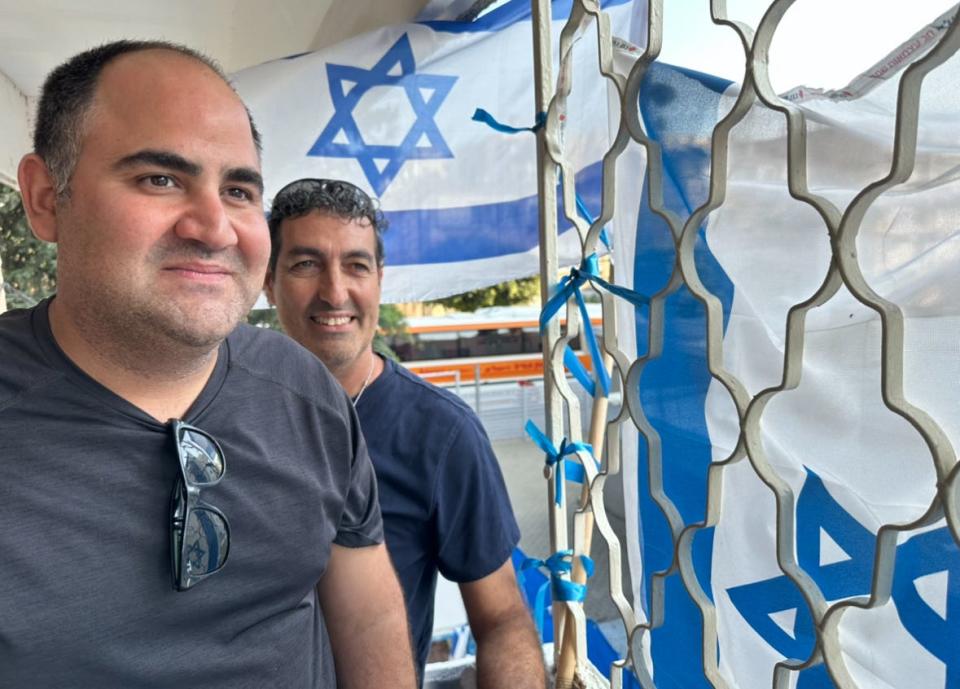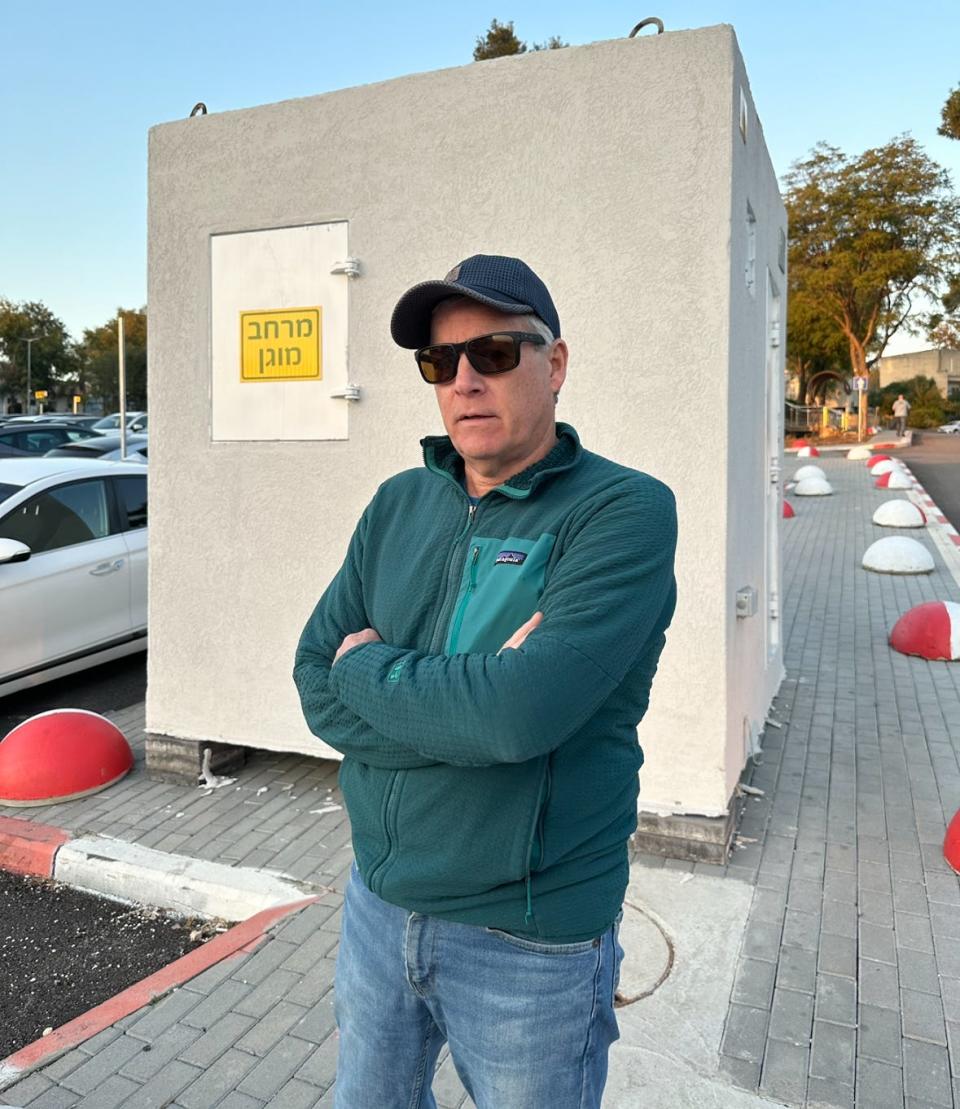Mark Patinkin in Israel: Traveling along the West Bank shows the price paid during conflict
- Oops!Something went wrong.Please try again later.
We are heading north out of Jerusalem, past towns carved impossibly into harsh limestone hills. The scenery is stunning but the land difficult, so much so that you wonder why tribes have fought over it since the Bible was born here.
The vistas are steep and terraced, a challenging place to build a single house, let alone a country. Yet somehow, both Jews and Arabs have created worlds here, and seeing what it took, and the price paid during conflict, you understand things better. The more you have to sacrifice to live in a place, the deeper the love for it.
An hour-plus into our bus journey north, we come across a long concrete wall, clearly a security structure. Our guide, Geoff Winston, tells us we’re looking at the West Bank, which explains things, too. Everything here is so close, two people wrapped around each other. It is as if geography itself is telling Jews and Arabs that at some point, somehow, they have to find a way.
Much of the world has condemned Israel for this war – as terrible as Oct. 7 was, the response in Gaza is said to be too much. But studying a map as we journey, I see us pass a point that explains the obsession here with security – some might say neurosis.
We are at the country’s narrowest neck – an absurd 9 miles wide. Forget the river to the sea. An enemy with the kind of fast vehicles Hamas employed could make it from border to sea in 15 minutes, cutting a nation in half.
We continue past a beautiful town unfolding up a difficult hill, signs mostly in Hebrew and English, clearly a well-off Israeli community. Except Geoff tells us it’s in fact Umm-al-Fahm, a prosperous Arab city, its eastern edge against the West Bank.

A decade ago, there was a peace proposal to swap it with similar communities in a land exchange for Jewish settlements, moving each to the other side of an adjusted border. Palestinian leaders denounced it for having the whiff of cleansing.
But Geoff tells us that although the folks in Umm-al-Fahm are strong supporters of Palestinians' rights, give them a choice between being Israeli-Arabs or West Bankers and it wouldn’t be a contest. They would stay put, as would most of the 2 million Arab citizens here.
More: He's written many columns about Israel. Now Mark Patinkin is going there to tell its stories
This being a Rhode Island Jewish Alliance mission, our journey north is to the city of Afula to see a sponsored youth program and sister hospital.
We gather indoors to hear about the first, and once again on this trip, it strikes me how few signs of war there are around us.
Then, there it is.
The youth program director says that in the past, its therapists dealt with the usual span of childhood traumas – family dysfunction and the like.
But now she presents a different kind of case, a woman and her 10-year-old son, Yoav, who were near Gaza that morning, an invader shooting her nephew in the chest, Yoav watching for hours as his mom tried to stop the bleeding with paper towels. But too much time went by, and the boy saw his nephew’s soul slip away, and such things have become a new category in the youth program’s treatment.
During a grab-lunch, I sit outside by our guide, Geoff. He’s 53, and as we chat, I learn again that almost everyone in Israel was touched by what happened. Geoff’s brother-in-law’s family lived in a targeted kibbutz.
“They say they were the lucky ones,” says Geoff, “only 30 were killed.”
One of the attackers landed there in a paraglider, and, at a critical spot, turned right on a street, walking into the first house and murdering a family. Geoff’s brother-in-law, along with his wife and four kids, were in the first house to the left. Had the killer turned that way, it would have been them. They survived over the next 10 hours in a safe room, and for the last 100 days they have been among the displaced, in their case in a nice hotel in Tel Aviv.
“And it sucks,” Geoff said. “They want to go home and they can’t.”
Mark Patinkin in Israel: Finding contrast between normalcy and war on first day
Our group has an armed guard – Aviad Reed, 34. He is carrying a 9mm handgun with two clips.
I ask if he knows anyone affected. He answers as if it is an obvious question.
“Of course.”
Several killed, including soldiers in Gaza, and two kidnapped.
I ask how their families are doing.
“Destroyed.”
I tell him I am trying to go see a devastated kibbutz, but you need to request it. With so many groups trying to visit, it’s hard for even journalists to get in.
When Aviad hears that that’s the work I do, he tells me I need to keep trying.
“The photos don’t help,” he says. “They don’t show the real truth. You have to see with your own eyes.”
He was at one of the sites only days ago and tells me that even more than the burnt-out homes, it’s the small things, like the sight of a pacifier still on the floor of a room where people were murdered.
“I’ve been to Auschwitz,” says Aviad, “but this is stronger. It’s not cleaned up.”
He gets emotional, saying he hopes I’ll be able to see, because the world is now saying it didn’t happen.
“That’s insane,” says Aviad. “It’s obscene.”
Our group moves on to Afula’s Emek hospital, sister to Providence’s Miriam Hospital, and as we walk the grounds, we come across a curious structure – a sturdy metal cube about 12 feet square, standing randomly by a parking lot.
I ask Aviad what it is. He explains that it’s a newly placed bomb shelter, and then he gets worked up about something, telling me there’s been a huge misconception out there.
All those secure places where Israelis retreated when the killers broke into their homes – Aviad says they weren’t “safe” or panic rooms. They were bomb shelters. No light, or air circulation – no plumbing or food. They were meant for 10 minutes of refuge. Yet people were in there for 20 hours. And worse – although the heavy doors seal with six connection points where rods go into holes to be blast-proof, they don’t lock. The metal hand lever can open from either side.

At that, Aviad goes inside the shelter to show me, gripping the lever with two white-knuckled hands. This, he says, is how people tried to survive, while the invaders twisted it on the outside.
“They held for their life for hours,” he says. Except many weren’t able to, and imagine, he tells me, the terror of what happened next.
His voice rises angrily and echoes against the metal.
“No bathrooms, nothing to eat, stifling air, hours and hours and hours.”
We have to rush up a sidewalk to catch the others at a new building in the hospital complex, six stories of steel and glass. When we go inside, I am surprised to see 50 beds in the basement, 50 more about to be added to the floor below.
“Why down there?” I ask the head of development, Yarov Sheffer.
He gives a one-word answer in accented English.
“Bombs.”
By which he means missiles. In their case, it’s not Hamas, but Hezbollah, at the closer Lebanon border.
When I was checking in for the flight to Israel at Logan, I began to chat with a gentleman behind me named David Shmaya. I asked where he lived. Kibbutz Ma’anit, he said, adding a curious phrase. He said it’s part of Israel’s “safe corridor.”
Meaning?
Just far enough from Hamas down south and Hezbollah up north that most missiles can’t reach it.
The light is getting low as we start the long bus ride back to Jerusalem. On various stretches, we see the wall marking the West Bank border, and as dusk turns to night, I find myself thinking again how much each side has given up to this place, including now.
Which is both dividing them more, and deepening their roots in this land.
Clearly, each is here to stay.
And you can’t help but think that somehow, someday, there has to be a way.
Mark Patinkin is traveling to Israel personally and is not sponsored by or affiliated with any organization. He will report firsthand from the region as he has done for the last four decades through his award-winning journalism. He can be reached at mpatinki@providencejournal.com.
This article originally appeared on The Providence Journal: West Bank journey explains Israel's obsession with security: Patinkin

